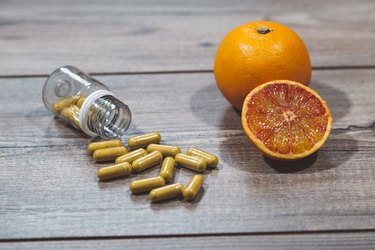
Strenuous training sessions can take a toll on your body, especially if you're not focussed on the recovery process. Post-workout vitamins and minerals, as well as, protein, carbohydrates and adequate hydration are critical to helping your muscles rebuild and recover after exercise.
Post-Workout Vitamins and Minerals
Video of the Day
Meeting the daily requirement for vitamins and minerals is essential for overall health, according to the American Academy of Family Physicians. Add in exercise most days of the week, and the need to get enough vitamins for muscle growth and repair becomes even more critical.
Video of the Day
"Vitamins are involved in various metabolic functions at the cellular level to form new and repair existing muscle, and exercise demands both of these functions," Monica Auslander Moreno, MS, RD, LD/N, nutrition consultant for RSP Nutrition, tells LIVESTRONG.com.
Moreno says the vitamins and minerals that are necessary for tissue repair, creating new tissue cells and fighting inflammation include:
- Vitamin C
- Vitamin E
- Vitamin B
- Zinc
- Selenium
- Magnesium
While vitamins C and E are great all-around vitamins, Moreno says, specifically, they are beneficial for active individuals. "Vitamin C is necessary for collagen formation and it is anti-inflammatory, which is important because exercise induces some inflammation," she explains. "Vitamin E is also anti-inflammatory and an antioxidant, which helps protect cells against damage."
The B vitamins, according to the Cleveland Clinic, are needed for normal metabolism of carbohydrates, protein and fats, among other things. And, without adequate amounts of any one of the B vitamins, you cannot properly convert these nutrients into energy.
The Mayo Clinic points out that calcium, potassium, iron and vitamin D are also essential nutrients for overall health and building a better body. They point to the importance of calcium in muscle contractions and potassium for its properties as an electrolyte that supports healthy muscles. Vitamin D is essential so your body can absorb calcium to promote bone growth.
Sources of Vitamins
Supplements are one way to ensure that you meet the recommended daily allowance (RDA) for vitamins. The RDA, which is different for men and women, is the amount of vitamins and minerals you need to avoid deficiencies and stay healthy. While taking a multivitamin or mineral supplement can help, consider making dietary changes to help get you closer to meeting these needs.
When it comes to vitamin C, citrus fruit and juices are often the first choice, but strawberries, kiwi, baked potatoes, broccoli and bell peppers are also packed full of vitamin C, according to the Academy of Nutrition and Dietetics.
Depending on the B vitamin, you can find this essential nutrient in foods such as whole-grain and enriched products, beans, chicken, fish, nuts, leafy green vegetables, avocado, pork, sweet potato, eggs and more.
You can find vitamin E naturally in foods like nuts and seeds and some green vegetables. But your best source of vitamin E, according to the Office of Dietary Supplements, is vegetable oils such as sunflower, safflower, soybean and wheat germ.
Getting vitamin D from the sun is one way to meet your needs, but you can also eat foods like salmon and mackerel or fortified dairy products such as milk.
Read more: How to Properly Take Vitamins
Other Post-Workout Tips
In addition to taking supplements such as vitamins for muscle growth and repair, make sure the recovery period after your workout is filled with healthy food and plenty of hydration. If done correctly, a good post-workout nutrition protocol can help improve recovery, lead to less muscle soreness, increase the body's ability to build muscle and improve immune function. Plus, with a little bit of planning, you can get most, if not all, of your vitamin and mineral needs in the foods you eat.
The goal in post-workout nutrition is to consume carbohydrates and protein, along with proper hydration with water or recovery drinks if you participated in an endurance event. The right foods can help replenish the glycogen lost during exercise. It also helps to rebuild and repair your muscles. To accomplish this critical task of recovery, the Academy of Nutrition and Dietetics recommends eating within one hour of completing an intense workout.
And, if you've been making an effort to meet your daily nutrition needs through food rather than supplements, this meal is also an opportunity to get a dose of your post-workout vitamins and minerals. One example is to make a smoothie with low-fat milk, fruit, vegetables and yogurt. If you're focusing on vitamin C and E after workout, consider adding some avocado or mango for some vitamin E and a kiwi or papaya for vitamin C.
- Academy of Nutrition and Dietetics: "Eating for Strength and Recovery"
- American Academy of Family Physicians: "Vitamins and Minerals: How to Get What You Need"
- The Mayo Clinic: "Nutrients to Build a Better Body"
- The Cleveland Clinic: "Vitamins: The Basics"
- Academy of Nutrition and Dietetics: "Timing Your Pre-and Post-Workout Nutrition"
- National Institute of Health, Office of Dietary Supplements: "Vitamin E -- Consumer"
- Academy of Nutrition and Dietetics: "What Are B-Vitamins"
- Essence Nutrition, Monica Ausländer Moreno: "Personal Interview"